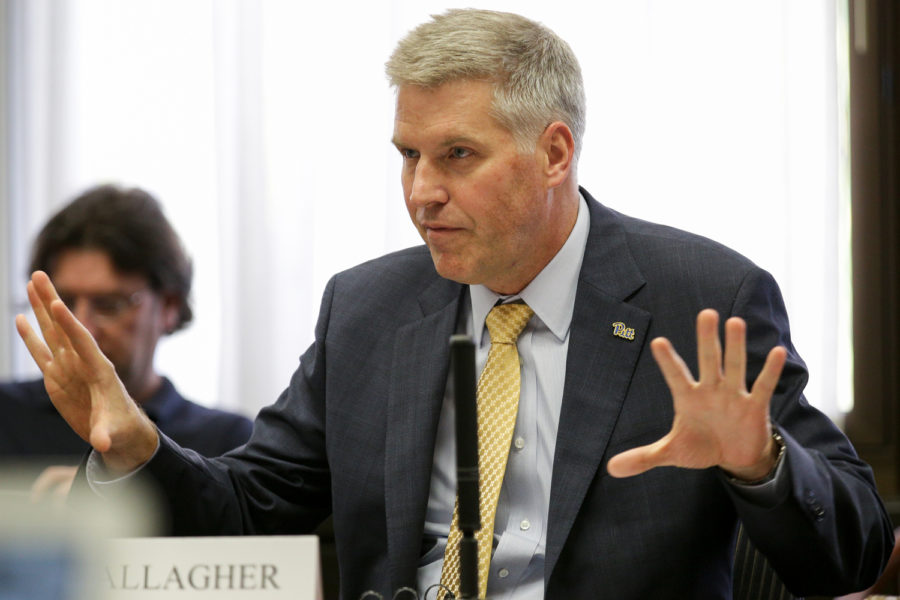Context: September Board of Trustees meeting
Thomas Yang | Assistant Visual Editor
Pitt’s Board of Trustees may discuss fossil fuel divestment at Friday’s meeting.
September 26, 2019
Pitt’s Board of Trustees will hold its third meeting of 2019 on Friday, providing an update on University affairs to the community. The Board is responsible for all key decisions at the University, including creating the annual budget and setting tuition prices. Chancellor Patrick Gallagher will deliver his annual report on Pitt’s progress during fiscal year 2018.
The Board will meet Friday at 10:30 a.m. in the Living-Learning Center’s Heritage Room at Pitt’s Johnstown campus. As the meeting approaches, here are some of the topics the Board might discuss.
Divestment
In recent years, Pitt has been under pressure from student groups to divest its endowment from fossil fuel investments. According to The Guardian, part of Pitt’s endowment as of November 2017 was invested in EnCap Energy Capital Fund IX-C, a Cayman Islands hedge fund, which was revealed in the Paradise Papers scandal last year.
Chancellor Patrick Gallagher announced in late August that the University is developing socially responsible investing strategies following the July release of a report examining several aspects of socially responsible investments (SRIs).
Gallagher charged Chief Financial Officer Hari Sastry with developing environmental, social and governance criteria to “positively screen” investments in accordance with University investment objectives and institutional values. Once developed, the criteria will be voted on by the Investment Committee of the Board of Trustees.
Sastry is also charged with screening and presenting proposed investment exclusions to the full Board of Trustees. Gallagher said the University must be careful when weighing the social value of excluding investments with the potential monetary value of including them.
At a larger level than SRI practices, Gallagher also tasked Sastry with further expanding and leveraging the University’s Sustainability Plan. The Sustainability Plan, released in 2018, is meant to introduce “deep and lasting changes” to create a University that is environmentally, socially and economically responsible.
At the time of the announcement, Gallagher thanked the numerous organizations involved in the SRI conversation — student activists, the Fossil Free Pitt Coalition, the University Office of Sustainability and the University Senate.
“I want to reiterate my deepest appreciation for your thoughtful contributions,” Gallagher said. “Your work has given us a wonderful starting point — one that enables us to better align activities in our endowment’s investment portfolio with our University’s core values.”
Master Plan
Pitt released a finalized version of its Campus Master Plan in February, which provides a 20- to 30-year roadmap for the University. The plan includes major renovations and expansions to existing facilities as well as the construction of several new academic and housing buildings, all to be completed within 20 to 30 years.
Included in the plan is new student housing, as well as an O’Hara Street student recreation center to be built on the current site of a parking garage and Pitt’s Learning Research and Development Center. At a February town hall, some community members and the chair of Pitt’s music department voiced concerns about the uncertain future of University’s historic Music Building, located at the corner of Fifth and Bellefield avenues.
The Property and Facilities Committee of the Board of Trustees approved several construction projects in April, notably the reconstruction of Bigelow Boulevard between Forbes and Fifth avenues, which is set to begin in November. It was also reported earlier this month that Pitt is considering building a hotel and conference center next to the University Club, a project which appears to not have been included in the original Campus Master Plan.



